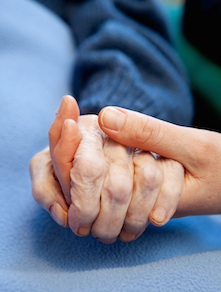By Kelly Coughlin
When, in 1985, James Bono began teaching a course on medical history at the Jacobs School of Medicine and Biomedical Sciences, the content of the course was predictable: an introduction to the history of medicine. Now, as the instructor of the Medical Humanities course at UB, he says his course “focuses on very mainstream issues,” adding that it does so, “always in the context of understanding.”
“Care is negotiated,” Bono explains as he describes his take on the doctor-patient relationship; the medical education a student receives must therefore “negotiate the different narratives that surround illness.”
This negotiation involves being able to reflect on what the experience of illness is, and how that experience is affected by the meaning illness has. That meaning could be the stigma associated with an illness, or the ramifications of extended hospital stays. While a doctor may be thinking about their patient’s physical health, the patient may be more preoccupied with their dwindling allotment of sick days at work, or how they will afford for childcare while they are receiving treatment.
“Doing medicine requires a focus on the individual in front of you,” Bono says, explaining that the physician’s role “is shaped by the arc or trajectory of [the patients’] lives.”
Through the Medical Humanities course students develop the ability to see their patients more holistically, and develop an ability to see them in their individual contexts. That sense of context includes age, gender, socioeconomic status and cultural background, as well as a plethora of other considerations that must be made in order for a physician to grasp their patient’s situation. If these aspects of the negotiation were ignored, the relationship would fall apart.
“The very experience of pain is affected by sociocultural or even individual factors,” Bono explains, and he describes the pain of childbirth as a prime example: The pain a patient experiences during labor is intense, but it is not viewed explicitly as suffering while other forms of pain, “even much less severe pain, when the patient doesn’t know where it is coming from,” is considered suffering.
“[Physicians] cannot and should not attempt to be mind-readers,” Bono states. “It is easy to jump to conclusions thinking that you know what’s at stake,” he explains, but the task of questioning must be approached with caution. One of the benefits of the Medical Humanities coursework is that it gives students the chance to practice their approach and learn to consider cues from their patient.
“What always strikes me is how varied they are,” says Bono of his students, “[that variety] enables students to respond to what we are reading, talking about, or seeing in different ways.” In Bono’s course, students are given examples from literature and film and asked to analyze those examples as they would a patient. This practice, when paired with the opportunity to interact with actual patients through other aspects of their program, gives students the full benefit of the Medical Humanities program.
Bono recalls Iris Murdoch – an Irish-born author who was diagnosed with Alzheimer’s disease – as a key example from his course. “The impact of that illness is different,” he says, explaining that while an Alzheimer’s diagnosis is always a tragedy, it would affect a patient like Murdoch, as a writer, differently than it would another patient.
Disability, as a concept, is another key consideration of the course.
“A tendency with disability is to medicalize it,” Bono says, but “scholars see it as a social category – it is structured by the way society is organized.” He explains that elements of architecture and organized movement bring consequences that, while unintended, should not be overlooked. The physician’s role in this debate is to realize that while there is a medical definition of disability, they must also come to understand their patient’s definition of disability.
A reoccurring question is whether or not it is possible to teach empathy. Bono says it is not. Instead, he argues against people whose response to issues in healthcare is to say that physicians must become more empathetic.
“They put me off a little bit,” he says of some critics, “[that argument] suggests [physicians] lack empathy or aren’t human.” This, according to Bono, is not the case. “The real issue is learning how to translate that humanity … into affective action.”
Kelly Coughlin is a senior at the University at Buffalo majoring in Biological Sciences and minoring in English. UB is home to the Omicron of New York Chapter of Phi Beta Kappa.




